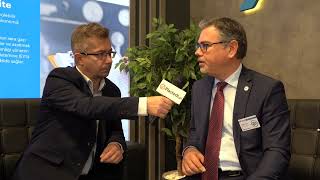 Novamont CEO underlines the potential of third generation biorefineries added value products.
Novamont CEO underlines the potential of third generation biorefineries added value products.Novamont CEO Catia Bastioli highlights the key role of third generation biorefineries for the production of added value products to restore regional competitiveness and to unleash innovation all along the value chain. Resource efficiency and local resources can and need to be the revitalised and valorised through a forward looking approach to bio based products.
On 16-18 October the most important industrial players and policy makers in the field of bioeconomy gather at EFIB 2012 in Dusseldorf, the European Forum of Industrial Biotechnology and Bio Based Economy to discuss future outlooks and policy. Catia Bastioli addressed the closing plenary on 18 October in a roundtable with other major CEOs moderated by Dr. Christian Patermann.
During the two days conference the European bioeconomy and its cross sectoral political dimension were debated between industry, EU officials and major stakeholders along the value chain. Catia Bastioli outlined Novamont vision for the bio economy, stressing the key role of added value products and third generation biorefineries. She showcased the major ongoing reconversion projects, Matrìca and Adria, which are focused on revitalising local areas severely hit by the current crisis.
In addressing the plenary debate Catia Bastioli, CEO of Novamont, outlined how the European Bioeconomy must leverage the potential of products with higher added value, such as biochemicals and bioplastics which can trigger high job creation and revenue for all actors in the value chain while preserving resource efficiency. In this context Third Generation Integrated Biorefineries are set to play a key role.
Currently Novamont, pioneer in the construction of third generation biorefineries, is working on two important reconversion projects: in Sardinia, through Matrìca a 50/50 joint venture with Versalis and in Adria, in the framework of a joint venture with Genomatica. In Sardinia, Matrìca will convert a petrochemical site into a third generation biorefinery which will produce bioplastics, biolubricants and chemical building blocks from local non-food crops.
“The fundamental goal of our third generation biorefinery project is to trigger employment and growth in Italian regions that have been seriously affected by the crisis and reinforce via cutting edge technologies the European Bioeconomy through added value products. The project is based on a close cooperation with the agricultural world, local institutions, research centres and universities, a cooperation that is essential for disseminating a culture of innovation in the area where the biorefinery will be built, in order to ensure it has a positive and concrete impact for all actors and future generations” said Catia Bastioli.


